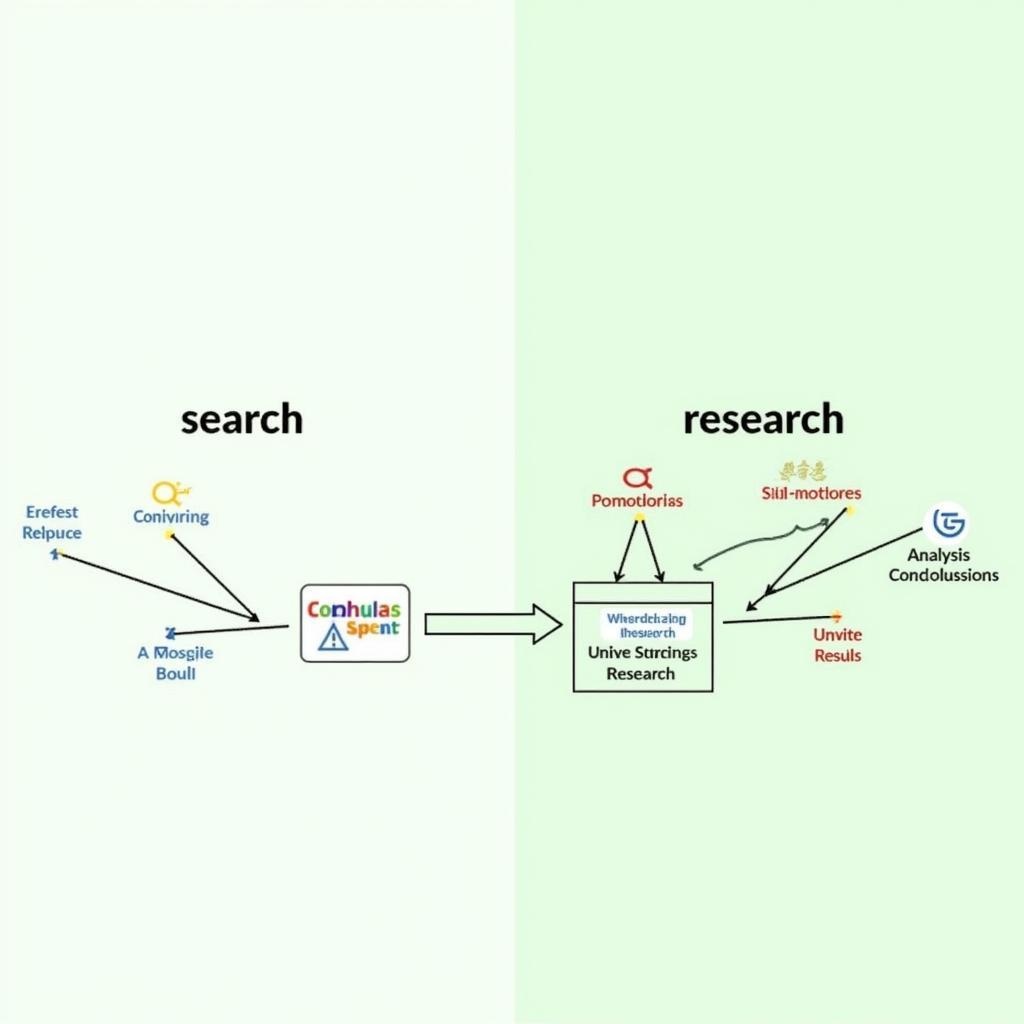The terms “search” and “research” are often used interchangeably, but in the realm of information discovery, they represent distinct processes. While a simple search might help you find a specific website or a quick answer, research delves deeper, aiming to uncover comprehensive knowledge and insights.
Delving into the Depths: Research Defined
Research goes beyond merely locating information; it involves a systematic and rigorous approach to gathering, evaluating, and analyzing data. It’s a journey of exploration driven by curiosity and a thirst for understanding. Whether investigating paranormal phenomena, scientific principles, or historical events, research demands a structured framework to ensure validity and reliability.
Key Characteristics of Research:
- Systematic Investigation: Research follows a predetermined plan, outlining objectives, methodologies, and data collection techniques. This systematic approach ensures that the process is organized and focused.
- Objectivity and Unbiased Analysis: Researchers strive to minimize bias and personal opinions, relying on factual data and logical reasoning. This objectivity strengthens the credibility of findings.
- In-Depth Exploration: Research delves into the intricacies of a topic, examining various perspectives and exploring multiple sources to gain a comprehensive understanding.
- Critical Evaluation of Sources: Not all information is created equal. Research involves critically assessing the credibility and reliability of sources to ensure the accuracy of information.
 Search vs. Research Process
Search vs. Research Process
Navigating the Surface: The Essence of Searching
Searching, in its simplest form, involves looking for specific information within a defined scope. We engage in searches daily, whether typing keywords into a search engine, browsing through a library catalog, or scanning a news website. It’s a quick and often informal way to retrieve information.
Common Search Scenarios:
- Finding a Specific Website: You need the website address for a local paranormal investigation group.
- Locating a Quick Fact: You want to know the date of a historical paranormal event.
- Getting Directions: You’re searching for the location of a supposedly haunted house.
While searching can be efficient for immediate information needs, it lacks the depth and rigor of research. Search results can be influenced by search engine algorithms, making it essential to critically evaluate the information retrieved.
Bridging the Gap: When Search Informs Research
While distinct, searching and research are not mutually exclusive. In fact, searching often serves as a crucial starting point for research endeavors.
How Search Supports Research:
- Preliminary Information Gathering: Conducting initial searches helps researchers gain a broad understanding of a topic, identify relevant keywords, and uncover potential sources of information.
- Discovering Relevant Sources: Search engines and online databases can lead researchers to scholarly articles, books, and other credible resources that form the foundation of their research.
- Exploring Different Perspectives: Searching for information from various sources exposes researchers to diverse viewpoints, challenging assumptions, and enriching the research process.
 Utilizing Online Research Tools
Utilizing Online Research Tools
Expert Insights on Search vs. Research
Dr. Emily Carter, a renowned researcher specializing in parapsychology, emphasizes the symbiotic relationship between searching and research: “Effective research builds upon a foundation of thorough searching. We leverage search tools to uncover the breadcrumbs of knowledge that guide us towards deeper understanding.”
Conclusion: Embracing the Power of Inquiry
Whether embarking on a comprehensive research project or seeking quick answers, understanding the nuances of “search” and “research” empowers us to navigate the vast landscape of information effectively. While searching provides us with readily available data, research encourages us to delve deeper, question assumptions, and uncover meaningful insights. By embracing both approaches, we unlock the true potential of information discovery.
FAQs: Unraveling Common Queries About Search vs. Research
1. Can I rely solely on search engines for my research?
While search engines are valuable tools, relying solely on them for research can be limiting. Search algorithms prioritize popularity and relevance, potentially overlooking specialized or academic sources crucial for in-depth research.
2. What are some effective strategies for conducting online research?
Utilizing keywords effectively, exploring reputable online databases and libraries, and critically evaluating the credibility of sources are essential strategies for successful online research.
3. How can I differentiate between credible and unreliable sources of information?
Consider the author’s expertise, the reputation of the publication, the presence of citations and references, and the overall objectivity and bias of the source when assessing its credibility.
4. What are some common pitfalls to avoid during the research process?
Confirmation bias, plagiarism, and inadequate citation are common pitfalls to avoid. Maintaining objectivity, properly attributing sources, and critically evaluating information are crucial for ethical and reliable research.
5. How can I organize the information I gather during my research?
Utilizing note-taking tools, creating outlines, and developing a system for categorizing and tagging information can significantly enhance the organization and accessibility of your research data.
Need assistance with your Paranormal Research? Contact us at:
Phone: 0904826292
Email: research@gmail.com
Address: No. 31, Alley 142/7, P. Phú Viên, Bồ Đề, Long Biên, Hà Nội, Việt Nam.
Our dedicated team is available 24/7 to provide support and guidance.